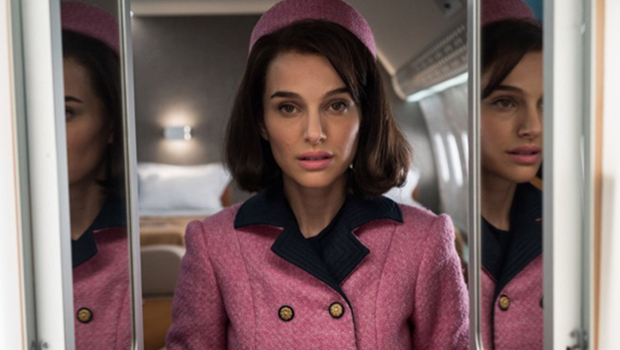Film Review – Jackie
3 min read
Directed by Chilean filmmaker Pablo Larraín and written by Noah Oppenheim, Jackie stars Natalie Portman as former First Lady Jacqueline Kennedy in the days directly following her husband’s assassination on November 22, 1963. The film’s opening scene shows Jackie meeting with Life magazine reporter Theodore H. White (Billy Crudup) at the Kennedy compound in Hyannis Port a week after the assassination to give an interview about her husband’s death and legacy. Interviews are often used as framing devices in biopics. They help create and maintain a respectful distance between storyteller and subject, something most biopics seem to prefer even if they pretend otherwise.
In its tasteful opening scene Jackie gives every impression of sticking to that convention, so it comes as something of a shock when the film reveals itself as a raw, almost uncomfortably intimate movie-going experience that plunges you into a grieving woman’s pain and demands you feel some small echo of it along with her.
Jackie also provides Natalie Portman with the opportunity to give her best performance in years. She so perfectly replicates Kennedy’s gratingly affected mid-Atlantic accent and prim, debutante physicality that it’s almost unsettling to watch her in a flashback sequence recreating the widely viewed 1962 television special A Tour of the White House with Mrs. John F. Kennedy. A less discerning actress would have tried to downplay the artifice inherent in each exaggerated enunciation and mannered gesture but Portman embraces it to portray a woman who was herself playing a part in a never-ending performance for the American public.
We get our first glimpse of the person behind the performer when Jackie takes a brief moment to wipe her murdered husband’s blood and her own tears from her face on the plane ride home from Dallas. She soon snaps back into character, lamenting to brother-in-law Robert Kennedy (Peter Sarsgaard) that Jack was murdered by some “silly little communist” rather than an opponent of the Civil Rights Movement. The former First Lady’s acute awareness of the human need for myth, symbolism and a sense of history is evident in both her observation to White that “people like to believe in fairy tales” during their interview and her actions throughout the film.
Jackie’s refusal to change out of her bloodstained pink Chanel suit for the swearing-in of Lyndon B. Johnson (John Carroll Lynch) as President and her insistence on giving Jack an ostentatious state funeral modelled after Abraham Lincoln’s are her way of giving the American people an outlet for their grief by allowing them to share in her own. Still, underneath all the pageantry of public widowhood lies a real, achingly lonely, despair-filled woman who drunkenly stumbles around the White House residence trying on gown after beautiful gown while listening to the original cast recording of the Broadway musical Camelot (Jack’s favourite), messily grieving her the loss of her husband, the father of her children and her home.
What sets Jackie apart from the typical biopic is the impressionistic approach Larraín takes to telling his subject’s story, one that is more about emotion, mood and sensory experience and less about a linear recitation of facts and events. He is assisted in this by Stéphane Fontaine’s woozily penetrating cinematography and Mica Levi’s strident, jittery score. In addition to Natalie Portman’s devastating lead performance Jackie features fantastic supporting performances from Crudup, Sarsgaard, Lynch, Greta Gerwig, Richard E. Grant and John Hurt.

